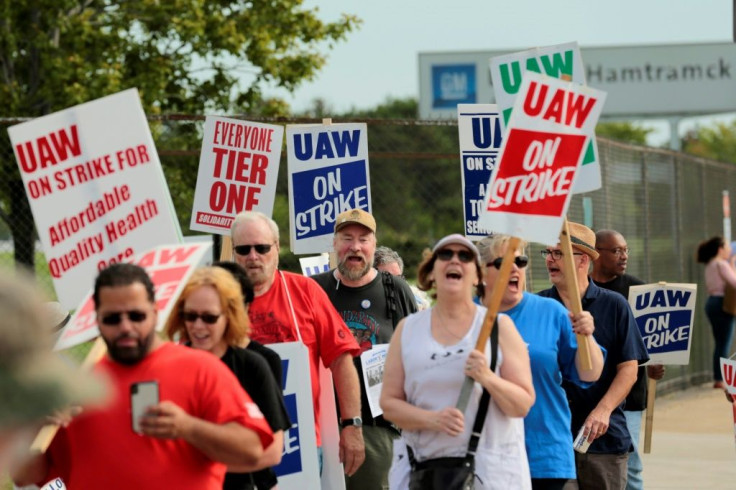GM Workers Mark 'Solidarity Sunday' On Week Two Of Strike

Union members picketing a sprawling automobile assembly plant in Detroit marked "Solidarity Sunday" as the United Auto Workers (UAW) strike against General Motors entered its second week.
Nearly 50,000 GM workers had walked off the job last week, beginning the largest industrial action to hit the carmaker in more than a decade, after talks on a new four-year contract between GM and the UAW hit an impasse.
On Sunday, about 250 union members holding up placards reading "UAW on strike" demonstrated outside the Detroit-Hamtramck assembly plant, joined by Democratic presidential contender Elizabeth Warren and sympathetic union members employed elsewhere.
The workers insisted they were willing to keep the strike going for as long as necessary.
"My dad is a retiree and told us that you have to be prepared, because you never know what the company is going to throw at you during a contract year," said Yolanda Passement, the recording secretary for UAW Local 22, adding that she'd been saving since January in preparation for a walkout.
Moriha Ross was on the picket line with her nine-year-old daughter who is deaf and suffers from cerebral palsy.
Anticipating a walkout, Ross made preparations for her care.
"We made sure we had all of our prescriptions filled," she told AFP.
Coianne Avant was forced to transfer to another plant in Flint, Michigan earlier this year when GM slashed production at the Detroit-Hamtramck facility ahead of its planned shuttering next January.
Before the strike began, Local 22 had gone to businesses and community groups asking for their support against GM, which announced last November that Detroit-Hamtramck was among three North American plants to be shuttered.
"I don't know why GM is doing (this). What they're losing every day with the plants not running would have paid for everything we're asking," Avant said.
The plant in Flint is her ninth in her two decades with GM, and requires a round-trip commute of more than 100 miles (161 kilometers) from her home outside Detroit.
Despite working overtime and saving what she can, Avant says she still struggles.
"I work from paycheck to paycheck just like everyone else. We make a livable wage. Most of the people can afford a house and a car. Now they don't even want to pay us that," she said of GM.
Hamtramck, surrounded almost entirely by Detroit, has been a home for auto manufacturing since Dodge Brothers started a plant in 1914.
GM's Detroit-Hamtramck plant opened in 1985 and has, from the start, been a source of controversy among workers.
A year after it opened, the company eliminated the plant's second shift, laying off hundreds, UAW Local 22 retiree Doris Parnell recalls.
"They've never lived up to their promise to the people who were working here," said Parnell, who added that the local government gave the company millions of dollars in tax abatements to pay for the plant's construction.
At the start of the strike, GM expressed disappointment, saying it had presented a "strong offer" and "negotiated in good faith".
Warren, the Democratic hopeful, told reporters that she was in complete support of the workers.
Their votes will be crucial for the Democrats to recapture Michigan, whose support for Donald Trump was key to his winning the 2016 election.
"We need a president in the White House that will go out and fight for unions," Warren said.
Congressman Andy Levin, a Democrat from one of Detroit's most famous political families, characterized the UAW strike as a battle against GM to protect middle-class wages and jobs.
"This is a fight for the soul of America," Levin told the crowd.
Also on the picket line was Jason Fatella, a UAW member from a nearby Fiat Chrysler Automobiles (FCA) plant who was out in solidarity with the GM employees.
"This is historic," he said, adding that the UAW was still negotiating its own contract with FCA.
"We're only asking for what's fair," he said.
© Copyright AFP 2024. All rights reserved.





















